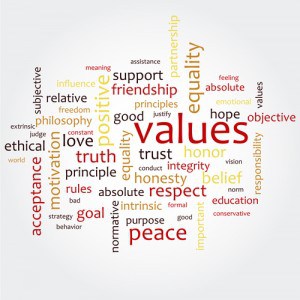 In today’s political culture, it’s hard to talk about “values” without someone getting feisty. We’ve all been there – what starts out as a benign exchange between friends or family suddenly transforms into a heated debate about social issues or foreign policy, all from that one word. Yes, values can have a negative connotation … often linked with judgment, specific religious affiliations or particular agendas.
In today’s political culture, it’s hard to talk about “values” without someone getting feisty. We’ve all been there – what starts out as a benign exchange between friends or family suddenly transforms into a heated debate about social issues or foreign policy, all from that one word. Yes, values can have a negative connotation … often linked with judgment, specific religious affiliations or particular agendas.
But what happens if we switch it up a little bit, and talk specifically about core values? Does this make a difference? I’m going to propose an answer: yes, it makes a huge difference. Because identifying your own core values – and living your life accordingly – can change your life.
What exactly are core values?
Values are not the same as morals. Here are some basic definitions:
Morals have a greater social element to them than values, and tend to have a very broad acceptance. Morals are more about the good and bad or right and wrong of a society.
Values are the rules by which we make decisions about right or wrong, should or shouldn’t, and good or bad. They also help us determine what is more or less important, which is useful when prioritizing or making those decisions.
Core values are how you feel in your gut about who you are, not who you think you should be to fit in. They are the backbone of your life, and what drives you to create the world in which you want to live.
Why are core values important?
A person without clear core values is kind of like a ship floating out at sea without a navigation system or captain – with no clear destination and no power to get to shore. On the other hand, when you have clearly identified your core values, you have the confidence and strength to act accordingly. You can align your decisions and choices with what you want and need. This internal navigation system brings confidence, harmony and peace.
How do you define core values?
When I work with clients, I usually have them brainstorm to come up with a list of common values, like: honor, honesty, gratitude, compassion, authenticity, abundance, good health, love and generosity. This serves as a good starting point. If you have trouble coming up with examples, head over to the contact page on my website and write “values” in the subject line. I’ll send you a complimentary values worksheet.
If it helps, ask yourself questions, like: What is important to me? How do I want to treat others? How do I want to be treated? What makes me thrive and feel accomplished? What qualities do I admire in my mentors or role models?
Once you have your initial list, try to narrow it down or merge similar words into one category. Set a timer and give yourself three minutes to circle the values that mean the most to you. Your goal is to have 5-7 core values.
Now what?
Gaining clarity and focusing on what truly matters to you – what is your heart’s desire – can bring you a great sense of relief when making decisions and setting goals.
For example, suppose being connected to others is one of your core values, but you are offered a promotion that involves extensive travel and working from remote locations. The pay is seductive, but you would have to leave the warm office environment you thrive in, filled with supportive colleagues and friends. Obviously, this promotion does not honor your core values (connectivity), and so your decision becomes clear.
If you’re clear on your personal values, then you can figure out what it is you really want. You can feel aligned and at peace as you navigate your professional and personal relationships and circumstances. Knowing your core values helps you spend each and every day in productive ways that support what makes you happy. You have an instant guide to help you navigate your life choices.
What are your core values?
How have your core values impacted your ability to make decisions or feel good about your path? Please tell us your stories and leave your comments below.
